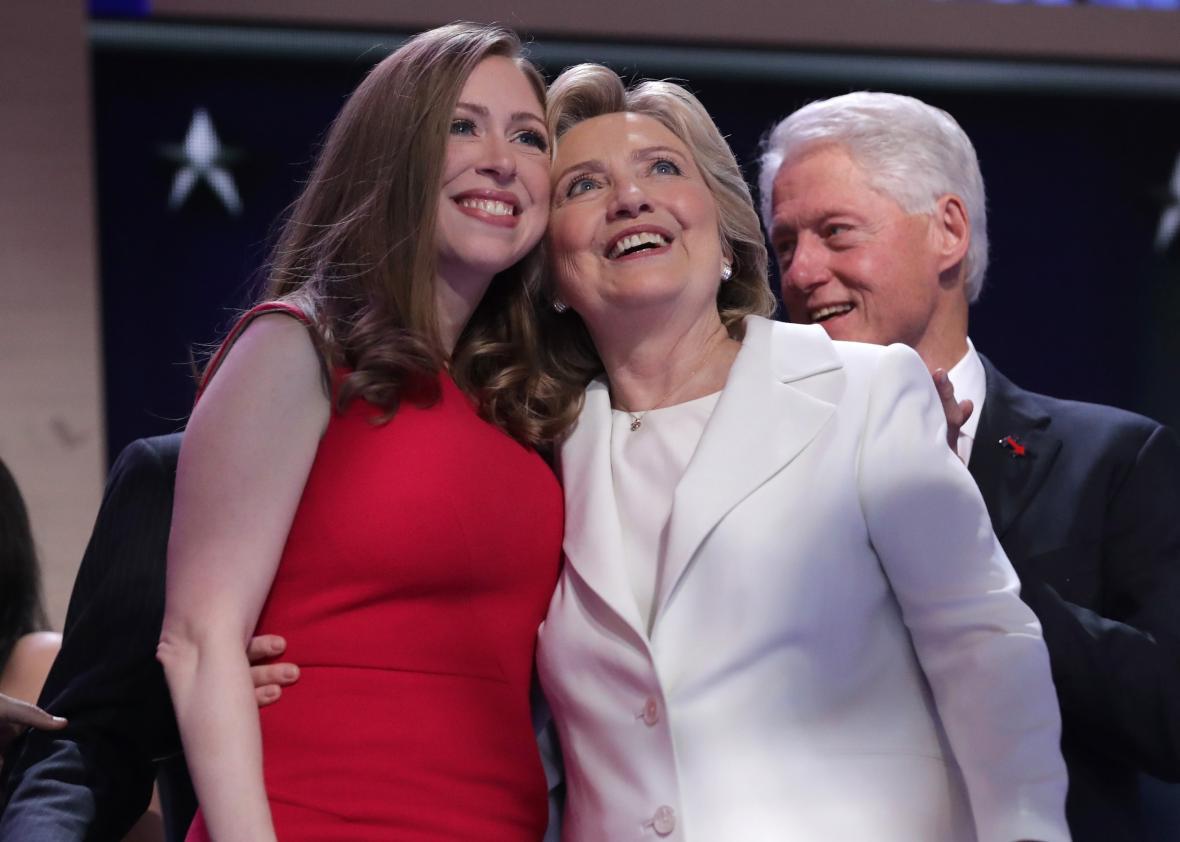The moral virtues of motherhood was one of the major leitmotifs of the Democratic National Convention. Michelle Obama praised Hillary Clinton for her “lifelong devotion to our nation’s children; not just her own daughter, who she has raised to perfection, but every child who needs a champion.” President Obama told the audience that “there is only one candidate in this race who believes in that future, and has devoted her life to it; a mother and grandmother who’d do anything to help our children thrive.” Bill mentioned Hillary’s mom bonafides four times in his speech, explaining how for Chelsea’s first seventeen years his wife “first and foremost was a mother.” And Chelsea explained how Hillary is her “role model, as a mother, and as an advocate.”
This emphasis on motherhood worked on a number of levels. It offers an archetype for female leadership that most of us are familiar with: We may have never had a female boss tell us what to do, but most of us have taken instruction from our moms. It’s also a way to usurp “family values” from Republicans. But perhaps most importantly, it tempers Clinton’s (unfair, in my opinion) reputation for steeliness and helps in the still-challenging task of being a successful politician who isn’t a white guy.
In a piece titled “Hillary Clinton is pushing the radical platform that mothers are the most powerful leaders in the world,” Quartz’s Hanna Kozlowska argues that this emphasis on motherhood may not just be a win for Clinton, but for all moms.
“[T]he Democratic party is flipping the narrative on motherhood; a traditional ‘weakness’ is now an asset. Motherhood has been brought out of the domestic sphere and has been transformed into an image of power,” Kozlowska writes.
This recasting of motherhood as a source of strength that transcends the domestic is both wonderful and complicated. The less savory side of using motherhood as a pretense for political power came up during a recent mini-scandal in the United Kingdom last month. Andrea Leadsom, then a contender for Prime Minister, made headlines when she said would make a better leader than then rival Teresa May because she had children. “[B]eing a mum means you have a very real stake in the future of our country, a tangible stake,” she said. Leadsom later apologized for the comments, which she says were taken out of context, and soon after dropped out of the race.
However she might have intended them, Leadsom’s comments tapped into the ridiculous yet enduring idea that women without children are more selfish and less trustworthy. When motherhood becomes a qualifying factor for public leadership, as it was presented at the Democratic National Convention, it reinforces the retrograde idea that having children is what makes women complete.
But here’s the thing: While liberating childless women from unfair stereotypes, we also need to be liberating women from the assumption that becoming a mom makes them less fit for leadership outside the home. Considering that, historically, most women in power have gotten there by either foregoing children or acting as though they didn’t have children in the workplace, we’ve still got a long way to go before we equate motherhood with universal competence.
And here’s another thing—remember I said this was complicated?—too much focus on motherhood might move us backwards to the time when a woman’s prime responsibility was not, heaven forbid, to herself, but instead to the molding of future generations. There’s nothing inherently wrong with politicians worrying about our children, but it’s a little troubling when such concerns continue to be the near-exclusive province of women.
One remedy to all this would be to replace some of the talk of motherhood with talk of caretaking, which most women, mothers and the childless alike, and many men, tend to do at some point in their lives. Clinton isn’t well-positioned to lead because she is a mother; she is well-positioned to lead because of her experience as an caretaker. This kind of work, which has long been invisible and without remuneration, has undoubtedly made Clinton more sensitive to those who need caretaking (mainly children), as well as those doing the caretaking. Having a presidential nominee who gets that is a win—one that, admittedly, probably wouldn’t have been achieved if we weren’t talking about a Mom-In-Chief heading to the Oval Office next year.
Moms are not be the most powerful leaders in the world, but caretakers might very well be. I, for one, am eager to give one a chance.
